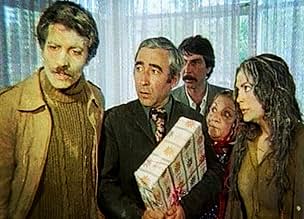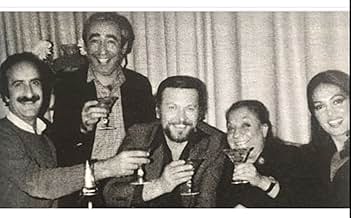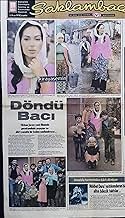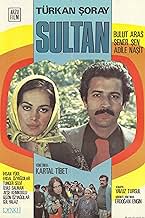Sultan
- 1978
- 1 h 28 min
AVALIAÇÃO DA IMDb
7,5/10
4,1 mil
SUA AVALIAÇÃO
Adicionar um enredo no seu idiomaPortrayal of a young depressed Turkish widow in the slums whose infinite dignity alone looks after her orphan kids is depicted by the son of the town sheriff, who is in love with her.Portrayal of a young depressed Turkish widow in the slums whose infinite dignity alone looks after her orphan kids is depicted by the son of the town sheriff, who is in love with her.Portrayal of a young depressed Turkish widow in the slums whose infinite dignity alone looks after her orphan kids is depicted by the son of the town sheriff, who is in love with her.
- Direção
- Roteirista
- Artistas
- Prêmios
- 5 indicações no total
Selim Nasit Özcan
- Kahveci Ali
- (as Selim Nasit)
Avaliações em destaque
The cult film of Turkan Soray,Ý think this film makes Turkan Soray a legend also her nickname in real life is SULTAN!She has got awesome eyes and acting talent!When with big and emotional eyes mixed with acting,she is perfect!she is much known in Turkey.Everyone knows her.The film is so emotional and makes me stun and sweet sad!As a result if you are Turkish you can cry when you see the film,if you aren't you wont cry but you love and this will real experience of watching Turkish film!A Turkish films are generally emotional and especially when Turkan Soray is in the film!Every country has got a culture and so this is blankly cultural film of Turkey.Ýf you wanna watch this film,i strongly recommend you that watch the face see the eyes and the familiar emotion of TURKAN SORAY...
Sultan (1978), directed by Kartal Tibet, is a time capsule of 1970s Turkey, a poignant reminder of the enduring power of cinema to capture and reflect societal issues. The film's soundtrack, filled with the melancholic strains of arabesk music, and the characters' names borrowed from popular TV shows (Charlie, Columbo, etc.), immediately transport us to a bygone era.
The film's narrative tackles a myriad of social issues that remain relevant even today. We witness the struggles of a rapidly urbanizing society grappling with infrastructure problems, land grabs for profit, and protests against the construction of a bridge. The film also delves into the role of women in society, highlighting their struggles for recognition and respect, as exemplified by a scene where a woman's testimony is dismissed at a police station.
Written by Yavuz Turgul in 1978, the script's continued relevance in 2024 underscores the importance of cinema as a repository of social memory. It's a testament to the film's enduring power that its themes continue to resonate with audiences decades later.
Sultan, with its evocative score composed by Cahit Berkay and its authentic depiction of life in the Rumeli neighborhood of Sariyer (where Sultan's shanty house still stands), is undoubtedly one of Kartal Tibet's finest works.
The characters are vividly drawn and memorable, particularly Ayse Kemikoglu, dubbed by Celile Toyon in the role of Asiye, and Enayi, the adopted stray dog. These characters, with their resilience and unwavering spirit, embody the struggles and hopes of a community facing adversity.
Sultan is more than just a film; it's a window into a specific time and place, a snapshot of a society grappling with change and upheaval. It's a testament to the power of cinema to capture the essence of a nation and its people, and a reminder that the stories we tell on screen can have a lasting impact on our collective consciousness.
The film's narrative tackles a myriad of social issues that remain relevant even today. We witness the struggles of a rapidly urbanizing society grappling with infrastructure problems, land grabs for profit, and protests against the construction of a bridge. The film also delves into the role of women in society, highlighting their struggles for recognition and respect, as exemplified by a scene where a woman's testimony is dismissed at a police station.
Written by Yavuz Turgul in 1978, the script's continued relevance in 2024 underscores the importance of cinema as a repository of social memory. It's a testament to the film's enduring power that its themes continue to resonate with audiences decades later.
Sultan, with its evocative score composed by Cahit Berkay and its authentic depiction of life in the Rumeli neighborhood of Sariyer (where Sultan's shanty house still stands), is undoubtedly one of Kartal Tibet's finest works.
The characters are vividly drawn and memorable, particularly Ayse Kemikoglu, dubbed by Celile Toyon in the role of Asiye, and Enayi, the adopted stray dog. These characters, with their resilience and unwavering spirit, embody the struggles and hopes of a community facing adversity.
Sultan is more than just a film; it's a window into a specific time and place, a snapshot of a society grappling with change and upheaval. It's a testament to the power of cinema to capture the essence of a nation and its people, and a reminder that the stories we tell on screen can have a lasting impact on our collective consciousness.
Você sabia?
Principais escolhas
Faça login para avaliar e ver a lista de recomendações personalizadas
- How long is Sultan?Fornecido pela Alexa
Detalhes
- Tempo de duração1 hora 28 minutos
- Cor
Contribua para esta página
Sugerir uma alteração ou adicionar conteúdo ausente
































